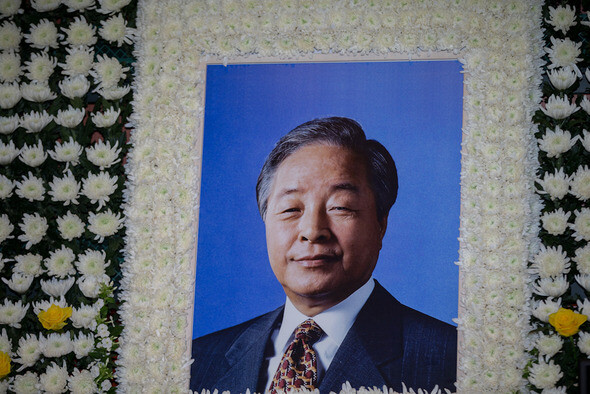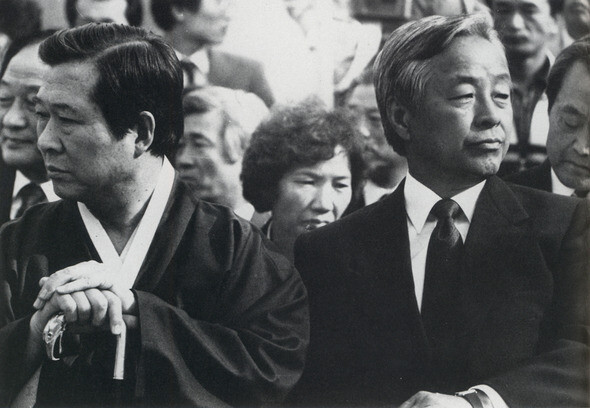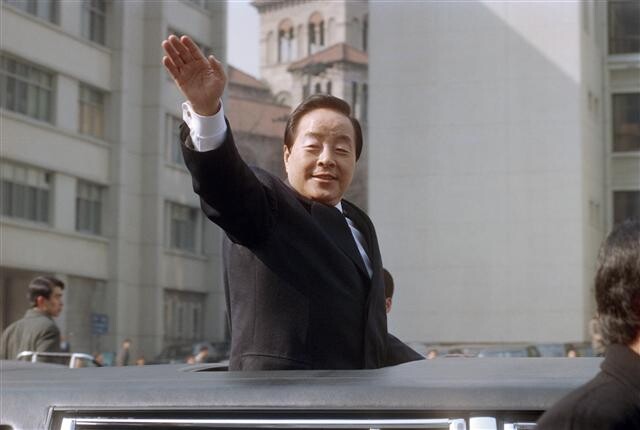hankyoreh
Links to other country sites 다른 나라 사이트 링크
[Editorial] With Kim Young-sam’s death, the passing of an era in South Korean politics

Kim Young-sam was born under a lucky star. Better known by the initials “YS,” he was a larger-than-life politician who left a heavy, distinct, and indelible footprint on the history of Korean politics.
Kim was an indomitable contender who never gave up the fight for democratization, and he played a leading role in sweeping out a string of presidents who began their careers in the army and ushering in civilian administrations. Even after being elected president, the bold measures he took for change and reform served as the launch pad for advancing South Korea to the next level.
Kim also mastered the art of radical political transformations. If the first half of his political career was as a fighter for democratization, his second act marked a dramatic shift to becoming a pivot of conservative politics. This volte-face casts a long shadow on South Korean politics even today.
Kim blazed a trail - marked with both glory and shame - in Korean political history along with Kim Dae-jung, president from 1998-2003. His death means that the “age of the two Kims,” as this period has been described, has passed forever into the pages of history.
While Kim made a number of memorable statements, the one that will probably be remembered the longest is this one: “Dawn will come even if the rooster is strangled.”
This is what Kim shouted when he was stripped of his seat in the National Assembly in Oct. 1979, the final turbulent days of the Yushin regime, and the statement proved prophetic. Kim’s removal from office triggered protests in the southern cities of Busan and Masan, known as the Buma Uprising, which ultimately spelled the end of the Park Chung-hee administration (1961-79).
Kim’s almost superhuman hunger strike during the presidency of Chun Doo-hwan - which he continued for 23 days, risking his life - was a catalyst in causing fissures in a dictatorship that had been believed to be as hard as a rock.
What makes Kim‘s death even more regrettable now of all times is the realization that South Korean democracy keeps moving backward and the fear that all of Kim’s efforts will have been for naught. Faced with the death of one of the major figures who established democracy in this country, one cannot help but ask whether we were mistaken to believe that the dawn had come and whether the rooster is still being strangled even today.

The reform measures that made history
The blitzkrieg of reforms that Kim implemented during his presidency - forcing public figures to disclose their assets, purging the army officers in the Hanahoe faction (followers of Chun Doo-hwan), and banning bank accounts under false names - were remarkable achievements that may justly be described as historic.
Thanks to these measures, South Korean society was spared the nightmarish prospect of another military dictatorship and taught the importance of economic transparency, the ethical duties of public officials and the fight against corruption.
Kim‘s reform measures served as a paradigm for future governments, not only in their rightness of purpose, but also in the way they were implemented - namely their timing, their thorough preparation, and the elbow grease that pushed them through.
Looking at the reform measures that the government has pursued recently, it’s impossible not to be disappointed. In terms of their content, they are too backward to be called reforms, and in terms of their methodology, they sadly don’t even hold a candle to Kim.
Though illuminated by flashes of brilliance, Kim’s political journey was also draped in dark shadows. It was Kim Young-sam who, together with Kim Dae-jung, was responsible for miring South Korean politics in a bog of regionalism. The two Kims’ failure to combine their candidacies in the 1987 presidential election was a decisive turning point not only for splitting the forces of democratization but also for entrenching regional conflict, thereby allowing Chun Doo-hwan’s colleague Roh Tae-woo to be elected.
With the three-party merger, Kim irreversibly turned regionalism into a perennial factor in Korean politics. The ramifications of that merger continue to cause problems today.
The region that had been praised during the Buma Uprising as being a flashpoint of democratization has now become a stronghold of conservatism. Korean politics has long been hobbled by the “unlevel playing field” of the South Korean political landscape - a landscape that Kim helped create.
Kim may deserve even more blame for this than for the part he played in landing South Korea in the 1997-98 Asian Financial Crisis during his presidency.

A political journey stained by the three-party merger
The sad legacy of Kim’s political about-face is plainly evident in the path taken by his political disciples. One can’t help but wonder if these were really the same people who once fought alongside Kim on behalf of democracy and against the dictatorship.
Perhaps the best example is Kim Moo-sung, leader of the ruling Saenuri Party (NFP). Immediately after Kim Young-sam’s death, Kim Moo-sung attended the visitation to pay his respects. “President Kim Young-sam was the political leader who truly achieved democracy in South Korean society,” Kim said, dubbing himself the former president’s “political son.”
But considering that Kim Moo-sung, instead of putting the brakes on the anti-democratic behavior of President Park Geun-hye, has been taking the lead in undoing democracy through various ideological attacks, it’s hard to understand how Kim could so blithely refer to himself as Kim Young-sam’s “political son.”
With his tumultuous political odyssey behind him, Kim has now become a part of history. The legacy he leaves behind him remains a challenge to be tackled by South Korea‘s politicians.
Countless politicians have congregated at Kim’s visitation to mourn his passing and to praise the significance of his life. But their mourning must not be in words only, and their praise should go beyond mere lip service. It is the responsibility of all politicians of this time to uphold the positive aspects of Kim‘s legacy and polish them until they shine even brighter, while correcting the negative aspects of his legacy.
We offer our heartfelt condolences. May Kim Young-sam rest in peace.
Please direct questions or comments to [english@hani.co.kr]

Editorial・opinion
![[Column] Has Korea, too, crossed the Rubicon on China? [Column] Has Korea, too, crossed the Rubicon on China?](https://flexible.img.hani.co.kr/flexible/normal/500/300/imgdb/original/2024/0419/9317135153409185.jpg) [Column] Has Korea, too, crossed the Rubicon on China?
[Column] Has Korea, too, crossed the Rubicon on China?![[Correspondent’s column] In Japan’s alliance with US, echoes of its past alliances with UK [Correspondent’s column] In Japan’s alliance with US, echoes of its past alliances with UK](https://flexible.img.hani.co.kr/flexible/normal/500/300/imgdb/original/2024/0419/2317135166563519.jpg) [Correspondent’s column] In Japan’s alliance with US, echoes of its past alliances with UK
[Correspondent’s column] In Japan’s alliance with US, echoes of its past alliances with UK- [Editorial] Does Yoon think the Korean public is wrong?
- [Editorial] As it bolsters its alliance with US, Japan must be accountable for past
- [Guest essay] Amending the Constitution is Yoon’s key to leaving office in public’s good graces
- [Editorial] 10 years on, lessons of Sewol tragedy must never be forgotten
- [Column] A death blow to Korea’s prosecutor politics
- [Correspondent’s column] The US and the end of Japanese pacifism
- [Guest essay] How Korea turned its trainee doctors into monsters
- [Guest essay] As someone who helped forge Seoul-Moscow ties, their status today troubles me
Most viewed articles
- 1[Column] The clock is ticking for Korea’s first lady
- 2Hong Se-hwa, voice for tolerance whose memoir of exile touched a chord, dies at 76
- 3After 2 months of delayed, denied medical care, Koreans worry worst may be yet to come
- 4[Column] Has Korea, too, crossed the Rubicon on China?
- 5[Correspondent’s column] In Japan’s alliance with US, echoes of its past alliances with UK
- 6US overtakes China as Korea’s top export market, prompting trade sanction jitters
- 7Samsung barricades office as unionized workers strike for better conditions
- 8All eyes on Xiaomi after it pulls off EV that Apple couldn’t
- 9More South Koreans, particularly the young, are leaving their religions
- 10John Linton, descendant of US missionaries and naturalized Korean citizen, to lead PPP’s reform effo